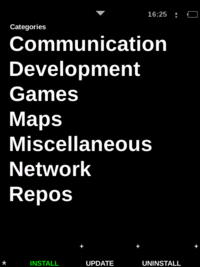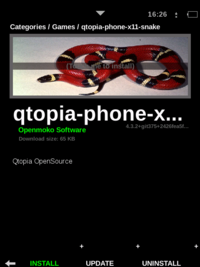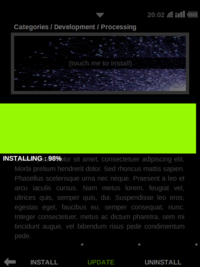Om 2008 Installer
From Openmoko
Om 2008
- Presentation
- Tips & tricks
- Keyboard guide
- Package manager
- Location sharing
Contents |
Introduction
The Openmoko Installer (Codename: Assassin) is a tool for installing, updating and uninstalling programs on your Neo.
Install an Application
Installer needs an internet connection to install applications for the repositories. This can be done via WiFi (currently unstable), USB, GPRS or Bluetooth.
[1] Make sure you are connected to the internet and launch Installer.
[2] At launch, Installer will initially refresh a list of installable programs. After refresh is complete, press the INSTALL button from the bottom bar to view a list of Categories. This is also the default page of the Installer application.
[3] Select a Category from the category list, then select a package to install.
[4] In the package information page, press the image box and confirm to begin.
[5] Once the progress bar shows Done, you will return to the Installer default page. Installation is then complete.
- To update or uninstall packages, simply replace step [2] with the desired function UPDATE or UNINSTALL and repeat steps [3] through [5].
How to add a Repository ?
Adding a repository allows the package manager to install softwares beyond those included in the original distribution. More power, but also more risk of breakage. Never add feeds which are not for your installed distribution base. If you don't want to add a repository, you can still try to install an application with:
opkg url_to_app.ipk
The community-repository is installed by default in Om 2008.8. Others are listed in the Users Repositories page. To add a feed, create a file named (for example) 'community-repos.conf' in the directory '/etc/opkg' containing a src (or src/gz to pull the gzipped package list) directive like:
src community-repos http://downloads.openmoko.org/repository/Multiverse/
Changes to the list of repositories made in '/etc/opkg' will be taken into account when the list of package is refreshed by:
opkg update
Another way to add repositories is to use the package manager itself and install a 'repository package'. Given that no other repository is proposed this way yet, the status of this functionality is unclear at present. Please edit this paragraph if you have more information.
Features
- Installer is a specialized GUI front-end of Packagekit over DBus interface.
- Installer should be run with stable network conditions and power supply. Once Installer is launched, it actively tries to connect to installed repositories. Timeout will make it unresponsive if the network condition is not stable. If you do not have access to WiFi, a USB connection is recommended.
- Installer refreshes the package meta-data every 2 days.
- The default Packagekit backend on Neo is opkg, but it is not restricted to opkg.
- You can also talk with Packagekit through DBus.
- Installer will launch packagekitd automatically, which will lock the libopkg to avoid synchronization trouble. Normally, the packagekitd terminates itself after about 5 minutes. If you want to use 'opkg', you may terminate Installer and:
killall packagekitd
See also
[1] Installer project - http://code.google.com/p/om-assassin/
[2] Packagekit project - http://packagekit.org/
[3] Opkg package management - Opkg
[4] List of Users Repositories




